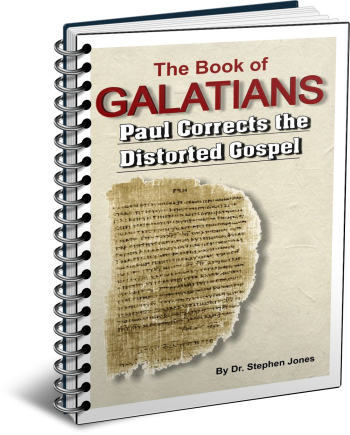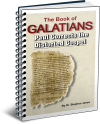Latest Posts
View the latest posts in an easy-to-read list format, with filtering options.

This is a verse-by-verse commentary on Paul's epistle to the Galatians, which was written to combat those Jewish Christians who were unable to leave the Old Covenant and adhere to the New Covenant. In their attempt to add the New Covenant to the Old, and to add Jesus to the temple system of animal sacrifices and other rituals, they had distorted the gospel.
Category - Bible Commentaries

Galatians 5:14 tells us that the whole Law is fulfilled by Love. Paul then brings out the contrast to Love, saying,
15 But if you bite and devour one another, take care lest you be consumed by one another.
Although this comes to us in the Greek language, keep in mind that Paul was using Hebrew imagery developed from the Hebrew language. The usual Hebrew word for “hate” is sawnay, which is derived from the letter s (shin), “to devour,” and the word shane, “a tooth.”
The word sawnay (“hate”) is spelled with three Hebrew letters:
s(shin) “to devour”
n(nun) “fish” (signifying life as in a swarm of fish)
a(alef) “ox” (signifying strength or that which is first)
Taken together, “hatred” is “to devour life as a first course of action.” Today we might rephrase this: “shoot first and ask questions later.”
Such hatred, of course, is a virtue of the spirit of Ishmael and characterizes those who are not true inheritors of the Abrahamic promise. We often see examples of this in both Judaism and Islam today—and, unfortunately, even in Christianity. When it becomes a religious duty to hate one's enemy, it is the prime manifestation of the spirit of Ishmael.
16 But I say, walk by the Spirit, and you will not carry out the desire of the flesh. 17 For the flesh sets its desire against the Spirit, and the Spirit against the flesh; for these are in opposition to one another, so that you may not do the things that you please.
Even as Ishmael and Isaac were in opposition to each other, so also the flesh and spirit cannot be reconciled. This forms part of Paul's appeal to the Galatians not to try to reconcile Judaism with Christianity, nor to claim that Hagar is the New Jerusalem. Those who attempt such a merger do not accomplish what they intended.
Paul spent more time explaining this in Romans 7 in his discussion about the flesh and spirit in opposition to each other within us. These are like two men fighting each other, the old Adamic man and the new man in Christ, the Last Adam. Paul says in Rom. 7:19, 20,
19 For the good that I wish, I do not do; but I practice the very evil that I do not wish. 20 But if I am doing the very thing I do not wish, I am no longer the one doing it, but sin which dwells in me.
Paul was showing that he had two “I's” within him, two selves in opposition to each other. He concludes in verse 25, “on the one hand I myself with my mind am serving the Law of God, but on the other, with my flesh, the law of sin.”
Hence, it is not the carnal mind that desires to serve the Law of God, but the spiritual mind, for being led by the Spirit means to follow the perfect will of God and to be in agreement with the Law (Rom. 7:16). It is the fleshly mind of the spirit of Ishmael that is still enslaved to the law of sin.
Getting back to Gal. 5: 18, we read,
18 But if you are led by the Spirit you are not under the Law.
Some people misinterpret this to mean that one is now free to sin by violating the Law whenever “led by the Spirit.” But the term “under the Law” is a reference to the sinner's position in relation to the Law. The Law has no jurisdiction over a man unless he sins, in which case the Law issues a warrant for his arrest and puts the sinner “under the Law” until full restitution has been paid.
Hence, Paul says that if you are led by the Spirit, following the Love principle, you will not be arrested by the Law, because (1) your debt was paid previously on the cross; and (2) you will not be found presently sinning. Paul then gives us a short list of sins that the flesh tends to do:
19 Now the deeds of the flesh are evident, which are: immorality, impurity, sensuality, 20 idolatry, sorcery, enmities, strife, jealousy, outbursts of anger, disputes, dissentions, factions, 21 envying, drunkenness, carous-ing, and things like these, of which I forewarn you just as I have forewarned you that those who practice such things shall not inherit the kingdom of God.
Paul was listing the characteristics of the spirit of Ishmael, not of Isaac. Those who place themselves under the authority of fleshly men or fleshly organizations will soon find themselves compelled to act as they do. The compulsion usually comes from the authority figures themselves, but more importantly, it comes from spiritual forces within. This is something I had to learn the hard way as well.
Hence, Christian Zionism, which has deliberately attempted to join with the spirit of Ishmael—thinking that he is the inheritor of the promise—has often manifested the same carnal spirit without even realizing it. They thought it was good that Menachem Begin’s Irgun gang blew up the King David Hotel in Jerusalem in July 1947, killing 91 people.
They have nothing but warm feelings for those Zionists who massacred over 250 old men, women, and children in the village of Deir Yassin on April 9, 1947 just because the Zionists wanted their land to build an airport later.
It was perfectly acceptable to Christian Zionists that the Jews expel Christian Palestinians in order to steal their land for Jewish settlers. Towns such as Kafr Baram and Ikrit were forcibly evacuated for “security” reasons, and then in 1953 the Land Acquisition Act gave the “uninhabited” land to the government. It was nothing but legalized theft.
When Ariel Sharon was assigned to destroy the town of Kibbiya and “to inflict as many casualties as I could,” and to “blow up every major building in the town,” according to Sharon’s own book (Warrior, page 88), not a whimper of protest came from the Christian Zionists.
They think it is a virtue to support murder, theft, and hatred against the Palestinians and against anyone who, like Isaac, is in opposition to the spirit of Ishmael. They have adopted the same spirit that pervades the most radical Israelis who would kill every Palestinian in sight if given the opportunity. Such action is always justified by the Old Testament example of Joshua’s conquest of Canaan, as if the Old Covenant (Hagar) methods are acceptable to God in New Covenant times.
Such actions are motivated, not by the Spirit, but by the flesh.
22 But the fruit of the Spirit is love, joy, peace, patience, kindness, goodness, faithfulness, 23 gentleness, self-control; against such things there is no law.
There is nothing in the Law of God that speaks against these attributes of the Spirit. That is because when we are led by the Spirit, we are in agreement with the Law and serve it rather than sin.
24 Now those who belong to Christ Jesus have crucified the flesh with its passions and desires. 25 If we live by the Spirit, let us also walk by the Spirit.
Paul implies in verse 25 that there are some who SAY they are led by the Spirit, but who do not actually bring forth its fruit in their daily walk. Obviously, those who truly live by the Spirit will also bear its fruit in their daily life.
26 Let us not become boastful, challenging one another, envying one another.
In my view this verse ought to have been the first verse of the next chapter, for it introduces a new topic. It has to do with our attitude and manner of discussion with those who (in our view) are less spiritual or who follow the desires of the flesh. As we will see in the next verse, Paul believes that those who stumble ought to be corrected, but not with boastfulness or envy, for such motives would merely pit one form of Ishmael against another.